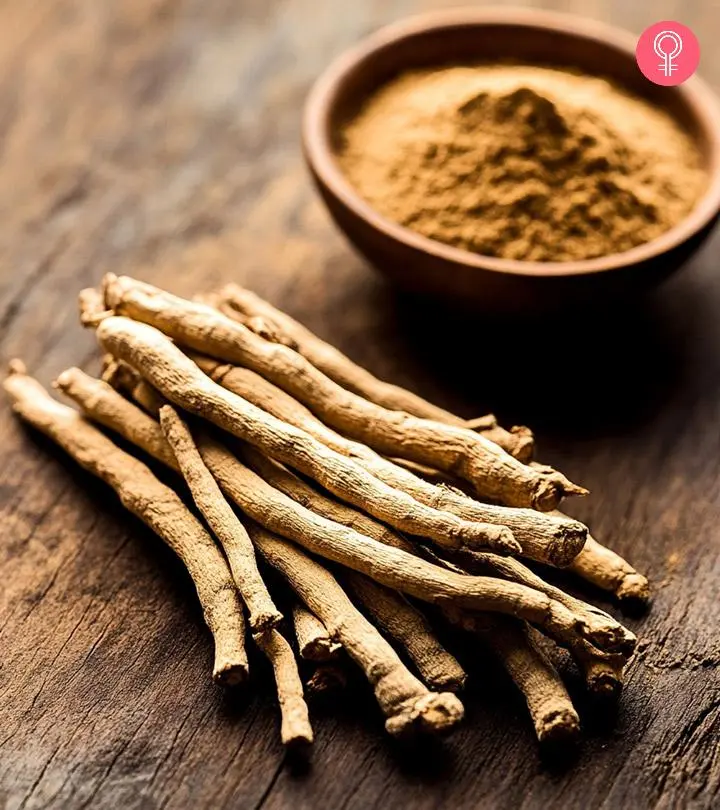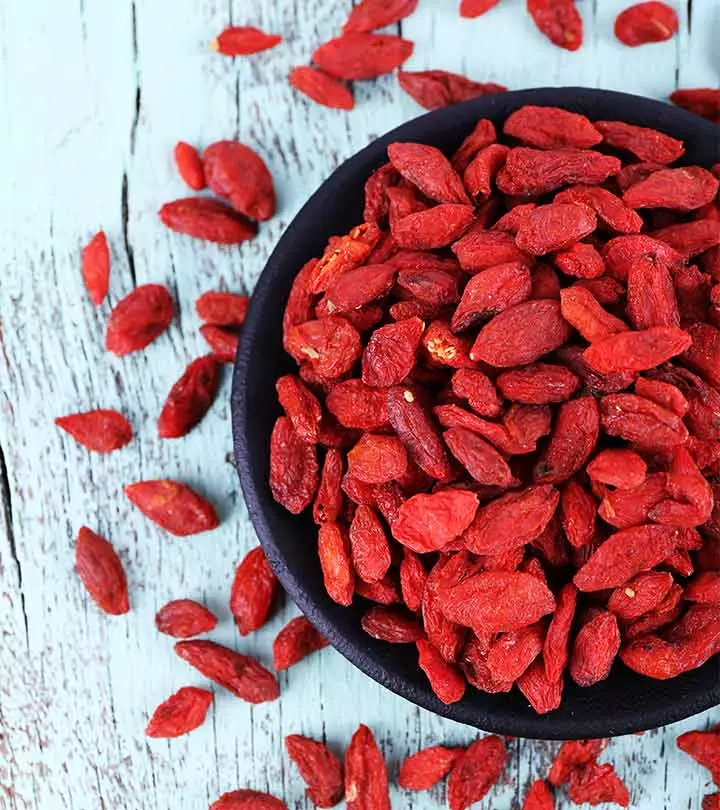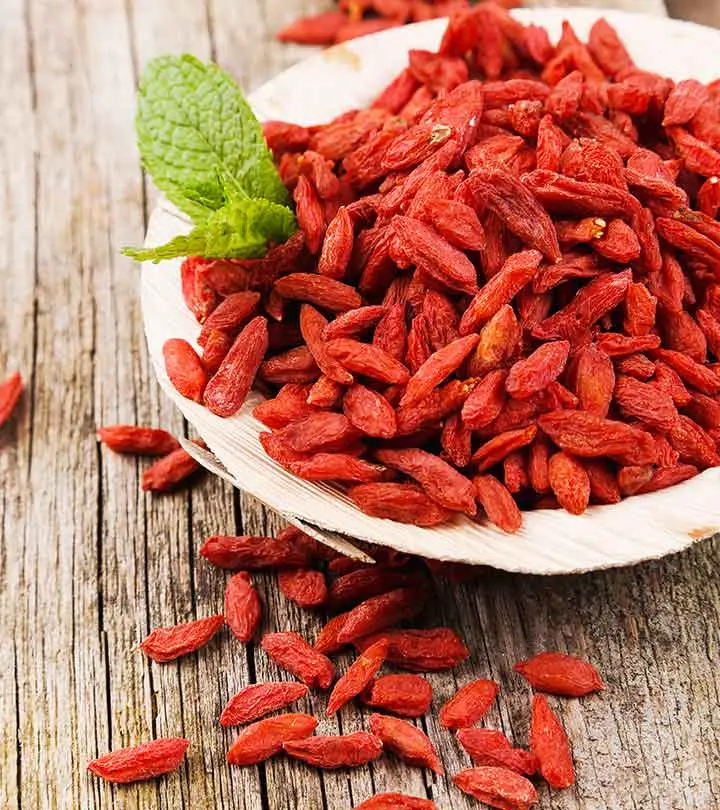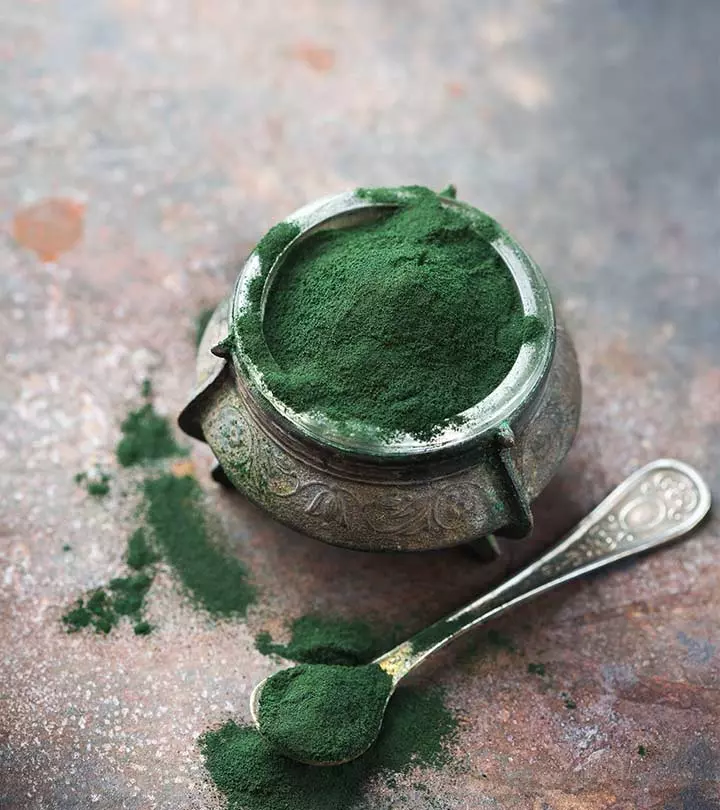15 Serious Side Effects Of Ashwagandha & Precautions To Take
From liver damage to dry mouth, this medicinal herb may have some unpleasant effects.

Image: Midjourney/ StyleCraze Design Team
Ashwagandha is one of the most used herbs in Ayurveda. It is scientifically known as Withania Somnifera. While it offers an array of health benefits, the side effects of ashwagandha are also documented. In people with allergies or autoimmune diseases, ashwagandha may cause adverse effects as it has immunomodulatory and hypoglycemici A property characterized by blood sugar levels that fall below the healthy range, causing sweats, chills, and tremors. properties. There is also some evidence that it may cause abortions. In this article, you will read more about such negative effects of this herb. Scroll down to know more about Ashwagandha’s side effects.

 Know The Flip Side: Ashwagandha
Know The Flip Side: AshwagandhaShort-Term Effects
May cause drowsiness, headache, stomach upset, or excessively low blood sugar levels.
Long-Term Effects
Liver health might be affected in certain circumstances.
Drug Interactions
May interact with medications that suppress the immune system responses or are used to treat insomnia as well as medication for lowering blood pressure.
When To See A Doctor
If you experience an allergic reaction such as rashes, difficulty in breathing, and chest pain.
In This Article
Uses Of Ashwagandha
Ashwagandha is a herb with a lot of significance in the Ayurvedic tradition. It has a range of valuable applications. It serves as a potent adaptogen that aids in stress and anxiety management and is used to promote overall emotional well-being.
It promotes better sleep quality and cognitive function. Further, it is rich in antioxidants which help protect against oxidative damage and reduce the risk of chronic diseases, while its anti-inflammatory properties make it a natural remedy for conditions such as arthritis and muscle pain (1). Anecdotal evidence suggests it may also help strengthen the immune system.
Nevertheless, excessive usage may lead to a host of negative effects as discussed below.
Key Takeaways
- Ashwagandha may cause several side effects in people with autoimmune disorders and allergies.
- It may induce abortions, cause liver damage, lower blood sugar levels too much, and aggravate hypothyroidism.
- In addition, people with prostate cancer, autoimmune conditions, and liver problems should avoid using this remedy.
What Are The Side Effects Of Ashwagandha?
1. May Be Harmful During Pregnancy And Breastfeeding

Ashwagandha is one of those herbs that can harm the baby or terminate pregnancy. According to reports by the Sloan-Kettering Memorial Cancer Center, ashwagandha can induce abortion (2).
Ashwagandha side effects for females may also cause miscarriages. There is little information on the safety of ashwagandha during breastfeeding. Hence, stay on the safe side and avoid its use.
Infographic: What To Look For In Ashwagandha Supplements?
Some thing wrong with infographic shortcode. please verify shortcode syntax Trivia
Trivia2. May Cause Liver Damage
Patients taking commercial herbal products containing ashwagandha were found to experience liver injuries (3). However, the herb’s mechanism in this regard is yet to be understood.
3. May Lower Blood Sugar Way Too Much

Studies show that ashwagandha can lower blood sugar levels (4). However, this may not be beneficial to someone on diabetes medication. The herb may lower blood sugar levels way too much. These changes in the blood sugar level can cause other complications.
Studies showed hypoglycemici A property characterized by blood sugar levels that fall below the healthy range, causing sweats, chills, and tremors. effects and effects on insulin sensitivity in diabetic rats (5), (6). Hence, those on diabetes medications may experience adverse effects with the intake of ashwagandha.
4. May Aggravate Hyperthyroidism

Ashwagandha is known to increase thyroid hormone concentrations. Hence, those with hyperthyroidism may experience undesirable symptoms (7). Hyperthyroidism is a condition characterized by excess levels of thyroid hormones in the serum.
Individuals diagnosed with hypothyroidism (underactive thyroid) must also consult their doctor before taking ashwagandha as the herb may interact with the associated medications and bring changes in thyroid hormone levels.
5. May Aggravate Autoimmune Diseases

Ashwagandha extract is known to boost the immune system (8). This property may be a problem for individuals diagnosed with autoimmune disorders, like rheumatoid arthritis, lupus, and multiple sclerosis. Medications taken for treating autoimmune diseases decrease immune system response, and supplementing them with ashwagandha may interfere with their effectiveness. More research is needed to understand the mechanism of ashwagandha on autoimmune diseases.
6. May Cause Gastrointestinal Issues

Excess ashwagandha may irritate the gastrointestinal tract (3). Hence, those with stomach ulcers are suggested to avoid the herb. Constipation was another side effect seen in a group that took ashwagandha (9). The herb may also cause diarrhea and an upset stomach (3).
7. May Cause Drowsiness
It may cause changes in sleep patterns. In rat studies, ashwagandha was found to have relaxing properties that might lead to drowsiness (10). Hence, someone on medications for insomnia may experience excessive sleepiness with the herb intake.
Ensure you don’t use the herb in conjunction with sleep medications like lorazepam, zolpidem, or alprazolam. Though the research about herb-drug interactions is limited, it is important to exercise caution.
Studies have also confirmed the sleep-inducing properties of ashwagandha (11). Taking the herb along with sedatives may lead to excessive drowsiness. Hence, consult your doctor.
8. May Lead To Erectile Dysfunction
It can cause negative changes in sexual function. As per researchers from the University of Ruhuna, ashwagandha root extract may cause erectile dysfunctioni A condition experienced by certain men that is characterized by the inability to keep an erection long enough to engage in sexual activity. and decrease male sexual performance (12). Though the herb is believed to be an aphrodisiaci Substances used to stimulate and increase sexual desire, pleasure, and arousal, which are abundant in almonds and pumpkin seeds. , this is something to be considered. More research on humans is needed to understand this phenomenon further.
9. May Causes Allergies
Allergic reactions have been reported anecdotally among some individuals who have taken ashwagandha. The reactions may include skin rashes, itchiness, inflammation, chest pain, dizziness, headache, and difficulty in breathing. People allergic to nightshades may also be allergic to ashwagandha. However, we need more research on this.
10. May Cause Fever
The use of ashwagandha may increase body temperature in some individuals. However, how this happens is yet to be understood. The elevated body temperature is said to return to normal in a few days. Information on this aspect is insufficient. If you have a high body temperature for any reason, consult your doctor before taking ashwagandha.
11. May Cause Bleeding
Ashwagandha may cause bleeding. Individuals with bleeding disorders are not recommended to take the herb. However, no concrete research supports this, except for anecdotal evidence.
12. May Cause Dry Mouth
Intake of excess ashwagandha may cause dry mouth in certain individuals. Though there is not enough research, it is better to exercise caution and consult your doctor if the condition arises.
Most of the side effects of ashwagandha are based on anecdotal evidence. While more research is ongoing, it is important to take precautions.
13. May Cause Kidney Damage
It may cause negative changes in kidney function. As per research, with its immunostimulatory effects, ashwagandha may lead to kidney allograft rejection (13). Therefore, people considering a kidney transplant should consult their doctor about the same.
14. May Lower Blood Pressure
While ashwagandha on its own might be beneficial for people with hypertension, its ability to lower blood pressure could prove fatal if combined with other hypertension-lowering drugs and medications. In addition, it could also prove dangerous for people with low blood pressure conditions (14). That’s why it is essential to consult a doctor before adding it to your wellness regimen, especially if you have any pre-existing conditions related to changes in blood pressure.
15. May Induce Drug Interactions
If you are on any medication, you should consult a doctor before you include Ashwagandha in your wellness routine. Ashwagandha may result in drug interactions, especially with sedatives, liver medications, diabetes, thyroid, cholesterol, or hypertension-related medications (5), (10), (11), (3),(8), (7). It may also cause changes in the immune system as it may interact with immunosuppressants.
Ashwagandha may also cause other side effects. Mary Sabat, MS, RD, LD, says, “Even though ashwagandha is thought of as a calming herbal supplement, it may cause anxiety in some people. In Ayurvedic medicine, it is believed that the ashwagandha’s heating energy may cause anxiety in some people due to its stimulating effects. The herb is also known to increase energy levels, alertness, and activity, which can be overwhelming for people who are prone to anxiety. Additionally, ashwagandha can also increase cortisol and adrenaline levels, both of which are hormones associated with stress.”
Mary Sabat adds, “Herbal supplements can be potent and work like drugs in the body. For most people, this herb is an adaptogen and helps with stress and sleep but for others, it could have the opposite effect leading to anxiety and possibly weight gain.”
Youtuber Dr. Dallin LeGrand Peterson, ND, took ashwagandha supplements for 30 days to help manage ADHD and documented his experience. He noticed that by the 2nd week he began to experience feelings of depression and reduced motivation, which was unusual for him. “By week four, it was a problem that I just could not keep on doing this (i).” The negative impact on their mood, energy, and motivation became a significant issue, leading them to consider discontinuing ashwagandha. “Really my final thoughts when taking ashwagandha for 30 days…it certainly wasn’t for me.”
Given the above side effects of ashwagandha, it is essential to consult a licensed medical practitioner before taking this herb in any form. Also, there are certain health conditions and situations wherein you should avoid ashwagandha altogether.
Who Should Not Take Ashwagandha

You should not include ashwagandha in your wellness routine in any form if you are dealing with any of the below health conditions.
- Hyperthyroidism: Ashwagandha may alter the normal functioning of the thyroid gland and may elevate thyroid hormones. This may cause issues in people with hyperthyroidism (15). It may also interfere with the results of thyroid tests. Hence, it’s important to inform your doctor if you are taking ashwagandha in any form.
- Prostate Cancer: Ashwagandha may potentially increase serum testosterone levels. This could be harmful for those with prostate cancer (16).
- Any Autoimmune Condition: Ashwagandha has immunostimulating properties, which can help boost the immune system (7). This may decrease the effects of immunosuppressant drugsi Drugs that suppress the immune system when it mistakenly attacks healthy cells and tissues, particularly a transplanted foreign organ. generally used for managing autoimmune disorders.
- Diabetes: Animal studies suggest that Ashwagandha may decrease blood sugar levels (5), (6). Intake of Ashwagandha may potentially lower blood sugar levels way too much in those who are on diabetes medications. Those with diabetes should consult with their doctor before taking ashwagandha.
- Liver Concerns: Ashwagandha, beyond its prescribed dose, may affect liver health or aggravate pre-existing liver conditions (3).
Considerations For Specific Groups
- Pregnancy: Ashwagandha has not been widely studied for its effects on human pregnancies. Hence, those who are pregnant are suggested to avoid it.
- Impending Surgery: Those who are about to undergo a surgery that requires anesthesia must stop taking ashwagandha at least two weeks prior. This is to prevent any potential drug interactions (17).
While most of the risks of ashwagandha may seem to be based on anecdotal evidence, it is still important to take precautions to avoid any adverse effects.
Precautions To Be Taken
It is important to take ashwagandha in the right dosage. Strictly follow medical advice to prevent any adverse reactions. Certain other precautions that one must take include the following:
- Ashwagandha root extract should be used only as a supplement as it is non-toxic in comparison to Withaferin A (the anticancer molecule).
- It is advisable to take ashwagandha with meals (or breakfast) with a full glass of water.
- As ashwagandha may increase the effects of certain drugs or medications, it is important to review the drugs or medications that you are taking before consuming them.
- Those who experience abdominal disorders after using ashwagandha should consult their doctor. Large doses of ashwagandha may cause stomach upset, diarrhea, and vomiting.
The ideal dosage of ashwagandha would be suggested by your doctor or healthcare provider. However, there are some recommendations you may want to know.
Recommended Dosage
- Powder (leaf): 1-2 teaspoons a day
- Root: 1-2 teaspoons a day
- Capsule: 1-6 g of the whole herb (by mouth) per day
- Tea: 3 cups of the whole herb per day (1-6 g)
- Tincture: 2-4 mL (by mouth), thrice a day
 Quick Tip
Quick TipPractical Advice To Follow
- Pregnant or breastfeeding individuals can consider safer alternatives like ginger or chamomile after consulting a doctor.
- If you experience liver issues, opt for liver-friendly herbs like milk thistle or turmeric under medical supervision.
- To manage low blood sugar, balance your diet with complex carbs, fruits, and proteins, and monitor glucose levels regularly.
- To avoid gastrointestinal issues, take ashwagandha in smaller doses with food or switch to gentler options like peppermint tea.
- If experiencing drowsiness, take ashwagandha in the evening or reduce its dosage. Also, avoid combining it with sedatives.
- For sexual dysfunction, consult a doctor for alternatives like ginseng or maca root, which may help improve performance.
- If you notice allergic reactions, discontinue using ashwagandha and try other adaptogens like rhodiola or reishi mushrooms.
- If you experience symptoms like fever or overheating, stay hydrated, rest, and switch to cooling herbs like peppermint or fennel.
Exceeding the dosage may cause side effects. There is less research to substantiate these dosage values. You may talk to your doctor for the exact dosage for you.
Ashwagandha is a popular herb with many medicinal properties. It has been used for treating many ailments and has a long history in alternative medicine. However, one must also be aware of some of the side effects of ashwagandha. Excess intake of this herbal remedy may induce abortion, changes in the liver function, lower blood sugar levels way too much, aggravate hyperthyroidism, and lead to autoimmune disease. Also, if you want to opt for ashwagandha supplements, get them from a reliable manufacturer. As it is not suitable for everyone, consult your doctor before using this herb.
Frequently Asked Questions
Can ashwagandha cause weight gain?
While no research yet states that ashwagandha can cause weight gain, one particular study suggests that the herb may help with weight management in adults dealing with chronic stress (18).
Can I take ashwagandha in the morning?
Yes, ashwagandha is an adaptogen and can be taken in the morning to help combat fatigue, stress, and positive changes in mood or behavior positively. However, it’s important to note that everyone reacts differently to supplements.
Should you take ashwagandha on an empty stomach?
There is no scientific evidence on the effects of ashwagandha on an empty stomach. However, if you feel discomfort or experience symptoms such as nausea or vomiting, contact a medical supervisor immediately.
Can you feel ashwagandha benefits right away?
No, you cannot feel ashwagandha benefits right away as ashwagandha and similar adaptogens need time to work and show results. Therefore, it may take up to 60 days of regular consumption to enjoy all the benefits of the herb and see results.
Can ashwagandha cause hair loss?
No, instead, ashwagandha could potentially help alleviate stress-related hair loss by reducing the cortisol levels in the body (19). However, there is no established evidence to support the role of ashwagandha in preventing or causing hair loss.
Can ashwagandha make you feel weird?
If taken beyond the prescribed dosage, Ashwagandha may make you feel drowsy, nauseous, or uncomfortable.
Is ashwagandha good for belly fat?
Ashwagandha is believed to have a natural cortisol-lowering property, which helps reduce stress. High levels of stress often lead to the storage of abdominal fat. Hence, ashwagandha, when combined with the right lifestyle changes, may help reduce belly fat. However, limited research is available in this regard. Mary says, “While ashwagandha has been linked to weight gain in some studies, the mechanism by which it may increase belly fat specifically has not been studied in detail. If cortisol is increased in a person using this herb however they would be more prone to put on belly fat as cortisol decreases insulin sensitivity and leads to fat storage around the abdomen. If a person decreases cortisol while using the herb they would be less likely to gain belly fat.”
Does ashwagandha cause body odor?
In Sanskrit, ashwagandha literally means “odor of the horse” (as the root smells like horse’s urine). However, taking this root doesn’t make one smell bad.
Does Ashwagandha make you emotionless?
Though there is no scientific evidence to prove this, anecdotal evidence suggests that Ashwagandha may cause emotional bluntness and a feeling of disassociation.
References
Articles on StyleCraze are backed by verified information from peer-reviewed and academic research papers, reputed organizations, research institutions, and medical associations to ensure accuracy and relevance. Read our editorial policy to learn more.
- Ashwagandha (Withania somnifera)—Current Research on the Health-Promoting Activities: A Narrative Review
https://www.ncbi.nlm.nih.gov/pmc/articles/PMC10147008/ - Ashwagandha | Memorial Sloan Kettering Cancer Center
https://www.mskcc.org/cancer-care/integrative-medicine/herbs/ashwagandha - Kurapati, K. R. V., et al. “Ashwagandha.” Withania somnifera.
https://www.ncbi.nlm.nih.gov/books/NBK548536/ - Udayakumar, Rajangam, et al. “Hypoglycaemic and hypolipidaemic effects of Withania somnifera root and leaf extracts on alloxan-induced diabetic rats.” International journal of molecular sciences 10.5 (2009): 2367-2382.
https://www.ncbi.nlm.nih.gov/pmc/articles/PMC2695282/ - Andallu, B., and B. Radhika. “Hypoglycemic, diuretic and hypocholesterolemic effect of winter cherry (Withania somnifera, Dunal) root.” (2000).
https://pubmed.ncbi.nlm.nih.gov/11116534///- - Anwer, Tarique, et al. “Effect of Withania somnifera on Insulin Sensitivity in Non‐Insulin‐Dependent Diabetes Mellitus Rats.” Basic & clinical pharmacology & toxicology 102.6 (2008): 498-503.
https://pubmed.ncbi.nlm.nih.gov/18346053/// - Panda, Sunanda, and Anand Kar. “Changes in thyroid hormone concentrations after administration of ashwagandha root extract to adult male mice.” The Journal of pharmacy and pharmacology 50.9 (1998): 1065-1068.
https://pubmed.ncbi.nlm.nih.gov/9811169/// - Singh, Narendra, et al. “An overview on ashwagandha: A Rasayana (Rejuvenator) of Ayurveda.” African Journal of Traditional, Complementary and Alternative Medicines 8.5S (2011).
https://www.ncbi.nlm.nih.gov/pmc/articles/PMC3252722/ - Chandrasekhar, K., Jyoti Kapoor, and Sridhar Anishetty. “A prospective, randomized double-blind, placebo-controlled study of safety and efficacy of a high-concentration full-spectrum extract of ashwagandha root in reducing stress and anxiety in adults.” Indian journal of psychological medicine 34.3 (2012): 255.
https://www.ncbi.nlm.nih.gov/pmc/articles/PMC3573577/ - Kumar, A., and H. Kalonia. “Effect of Withania somnifera on sleep-wake cycle in sleep-disturbed rats: Possible GABAergic mechanism.” Indian journal of pharmaceutical sciences 70.6 (2008): 806.
https://www.ncbi.nlm.nih.gov/pmc/articles/PMC3040882/ - Kaushik, Mahesh K., et al. “Triethylene glycol, an active component of Ashwagandha (Withania somnifera) leaves, is responsible for sleep induction.” PloS one 12.2 (2017).
https://www.ncbi.nlm.nih.gov/pmc/articles/PMC5313221/ - Ilayperuma, I., W. D. Ratnasooriya, and T. R. Weerasooriya. “Effect of Withania somnifera root extract on the sexual behaviour of male rats.” Asian Journal of Andrology 4.4 (2002): 295-298.
https://pubmed.ncbi.nlm.nih.gov/12508132// - Ashwagandha and Kidney Transplant Rejection – PMC
https://www.ncbi.nlm.nih.gov/pmc/articles/PMC7710824/ - Effect of Ashwagandha (Withania somnifera) Root Powder Supplementation in Treatment of Hypertension
https://www.tandfonline.com/doi/abs/10.1080/09735070.2012.11886427 - Efficacy and Safety of Ashwagandha Root Extract in Subclinical Hypothyroid Patients: A Double-Blind Randomized Placebo-Controlled Trial
https://pubmed.ncbi.nlm.nih.gov/28829155/ - A Randomized Double-Blind Placebo-Controlled Crossover Study Examining the Hormonal and Vitality Effects of Ashwagandha (Withania somnifera) in Aging Overweight Males – PMC
https://www.ncbi.nlm.nih.gov/pmc/articles/PMC6438434/ - Ayurvedic medicine and anaesthesia – PMC
https://www.ncbi.nlm.nih.gov/pmc/articles/PMC3190505/
- Choudhary, Dnyanraj, Sauvik Bhattacharyya, and Kedar Joshi. “Body weight management in adults under chronic stress through treatment with Ashwagandha root extract: a double-blind, randomized, placebo-controlled trial.” Journal of evidence-based complementary & alternative medicine 22.1 (2017): 96-106.
https://pubmed.ncbi.nlm.nih.gov/27055824// - An overview on ashwagandha: a Rasayana (rejuvenator) of Ayurveda
https://pubmed.ncbi.nlm.nih.gov/22754076/
Read full bio of Madhu Sharma
- Mary Sabat, MS, RDN, LD, is a registered dietitian and a certified in personal training by the American Council of Exercise. She has 30 years of experience in nutrition education, wellness coaching, fitness training, holistic health, and weight loss coaching. She obtained her bachelor's degree in Dietetics and Nutrition from the University of Delaware and master’s degree in Human Nutrition with an emphasis on Exercise Science from Rutgers University.
 Mary Sabat, MS, RDN, LD, is a registered dietitian and a certified in personal training by the American Council of Exercise. She has 30 years of experience in nutrition education, wellness coaching, fitness training, holistic health, and weight loss coaching. She obtained her bachelor's degree in Dietetics and Nutrition from the University of Delaware and master’s degree in Human Nutrition with an emphasis on Exercise Science from Rutgers University.
Mary Sabat, MS, RDN, LD, is a registered dietitian and a certified in personal training by the American Council of Exercise. She has 30 years of experience in nutrition education, wellness coaching, fitness training, holistic health, and weight loss coaching. She obtained her bachelor's degree in Dietetics and Nutrition from the University of Delaware and master’s degree in Human Nutrition with an emphasis on Exercise Science from Rutgers University.
Read full bio of Varsha Patnaik
Read full bio of Ravi Teja Tadimalla
Read full bio of Payal Karnik



























Community Experiences
Join the conversation and become a part of our empowering community! Share your stories, experiences, and insights to connect with other beauty, lifestyle, and health enthusiasts.